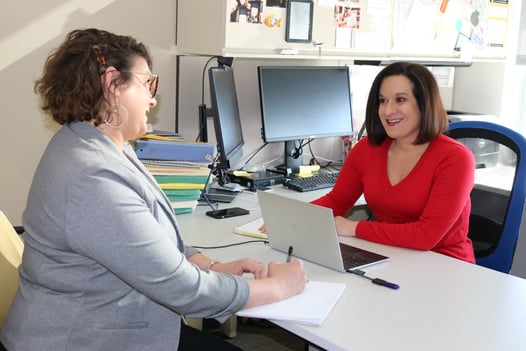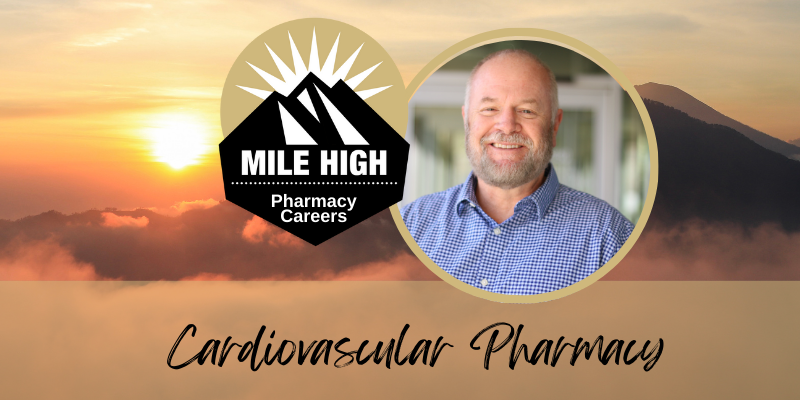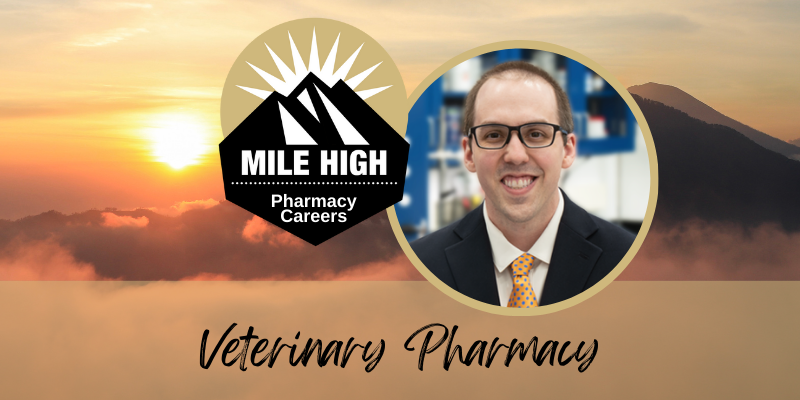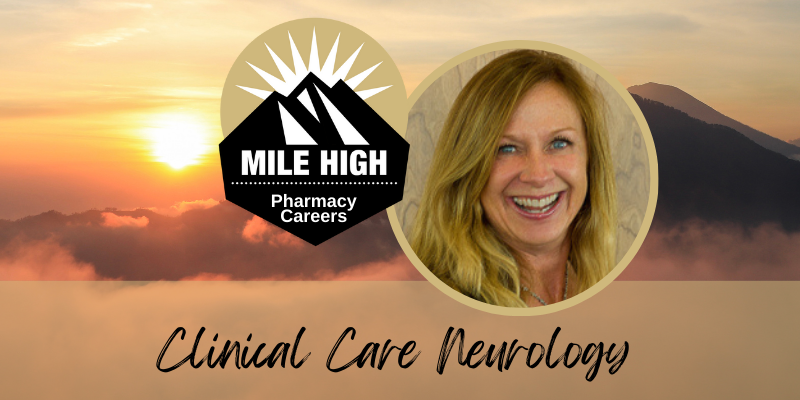Pharmacists at the Skaggs School of Pharmacy and Pharmaceutical Sciences are leading the charge in the field of pharmacogenomics with their knowledge of how genetics influence how drugs work in the body.
“We know that medications do not work the same way in all people,” explained Christina Aquilante, PharmD, Professor at CU Pharmacy and director of pharmacogenomics for the Colorado Center for Personalized Medicine (CCPM), a partnership between UCHealth and University of Colorado Anschutz Medical Campus. “Pharmacogenomics helps explain some of the variability in the population by studying how genetic variations affect a person’s response to medications. The goal of this discipline is to use genetic information to help clinicians select the most appropriate medication and dose for a patient.”

Dr. Aquilante (right) talking to a PhD student about her work in pharmacogenomics. |
Dr. Aquilante and her colleague David Kao, MD, lead the pharmacogenomics clinical integration efforts for CCPM. Right now, there are over 60 medications with published guidelines that instruct clinicians on how to use genetic information to modify drug therapy. For example, information about variation in a gene that breaks down two chemotherapy drugs, 5-fluorouracil and capecitabine, lets a clinician know if the patient is at risk for developing severe toxicities to these medications. If the patient has the genetic variants, then the clinician can use a lower dose or an alternative drug.
The Future is Now
“When I talk about this topic, people often say it sounds cool and that it is the future of pharmacy and medicine,” Dr. Aquilante said. “That certainly is true, but it is also important to acknowledge that pharmacogenomics is actively being used right now in many clinical settings across the United States (and the world). It’s happening more than people think – for example, it’s happening right now in our backyard at UCHealth.”
In partnership with UCHealth and the University of Colorado Anschutz Medical Campus, the CCPM team has created a biorepository called the biobank. Participants voluntarily enroll into the research study and after consenting, a blood or saliva sample is obtained. The samples and genetic data generated from them are used to research health and disease and may someday lead to discoveries that will change current standards of care. The biobank is also qualified to return medically-actionable clinical genetic test results to participants and their healthcare providers.
To date, over 200,000 participants have consented for the biobank research study, with over 100,000 samples currently being stored. Recently, the biobank hit a milestone, as over 10,000 participants have received clinical pharmacogenomic test results.
This is where Dr. Aquilante, Dr. Kao, and their team come in. “We have a preemptive return of results model – meaning that results are returned before they may be needed in clinical care. So, it is essential that our team builds drug-gene specific clinical decision support tools in the electronic health record, which provide clinicians with pertinent pharmacogenomic results and clinical guidance, when they are relevant and needed, at the point-of-prescribing,” Dr. Aquilante explained.
This life-changing personalized medicine wouldn’t happen without all the partnerships and teams working together to improve patient care.
“Although not a typical ‘alert,’ one of our drug-gene interaction examples was recently featured in a UCHealth Today piece – with a focus on oncology and how genes have the potential to affect high-risk chemotherapy agents,” Dr. Aquilante said.
Dr. Aquilante is a pioneer in her field, and as she explained, she got on the research and genetics bus and never got off.
“During pharmacy school at the University of North Carolina at Chapel Hill, I was in the Honors Research Program and then did a summer undergraduate research training program at the University of California San Francisco (UCSF). While at UCSF, I was introduced to basic science genetic research and ultimately was connected to clinical pharmacogenomics research,” she said. “I pursued a PGY1 at Shands Hospital (now UFHealth) and then completed a cardiovascular pharmacogenomics research fellowship at the University of Florida College of Pharmacy under the mentorship of Julie Johnson, PharmD.”
Integration and Collaboration
A day in Dr. Aquilante’s life is busy.
“I wear a lot of different hats and on any given day I can be changing hats quite often – moving between the School of Pharmacy, School of Medicine, and UCHealth multiple times a day,” she said.
One of her first jobs is to lead pharmacogenomics efforts for the Colorado Center for Personalized Medicine with Dr. Kao (Medical Director of CCPM), Dr. Kristy Crooks (Director of the CCPM Biobank), and Emily Hearst, MHSA (Program Director for the UCHealth CARE Innovation Center). The purpose of these interactions is to facilitate the integration of pharmacogenomic results into the electronic health record in an automated, seamless, and meaningful way.
Next, she meets with UCHealth clinical decision support analysts about the best way to build tools to surface results and provide guidance to clinicians at the point of prescribing. Other meetings include clinician subject matter experts and end-users, all with the goal of soliciting input on drug-gene pairs actively being worked on or planned for down the road.
Her next task is to work closely with CU Pharmacy faculty and fellows who are integral members of the pharmacogenomics implementation team, executing the goals and mission of the biobank return of pharmacogenomic results initiative. These folks include School of Pharmacy faculty Heather Anderson, PhD, Yee Ming Lee, PharmD, Jimmy Martin, PharmD (fellow), and Katy Trinkley, PharmD, PhD with the School of Medicine.
.png?width=352&height=352&name=Yee%20Ming%20Lee%2c%20PharmD%20(1).png)
|
Dr. Aquilante also teaches pharmacogenomics for entry-level PharmD students in the fall semester and a course for practicing pharmacists as part of the American College of Clinical Pharmacy Certificate Program in Precision Medicine-Applied Pharmacogenomics. And last, but certainly not least, she does research and mentoring. Most of her research is currently focused on clinical pharmacogenomics implementation, so it dovetails nicely with what she is doing with the biobank program. In this capacity, she mentors a graduate student, Alaa Radwan, and a postdoc, Jimmy Martin.
“Pharmacogenomics implementation at the health-system level is a team sport,” she added. “And we have an awesome, talented, multidisciplinary team. I feel lucky to work with such an innovative, visionary health system and such smart, motivated colleagues. It makes my job fun!”
-1.png)



